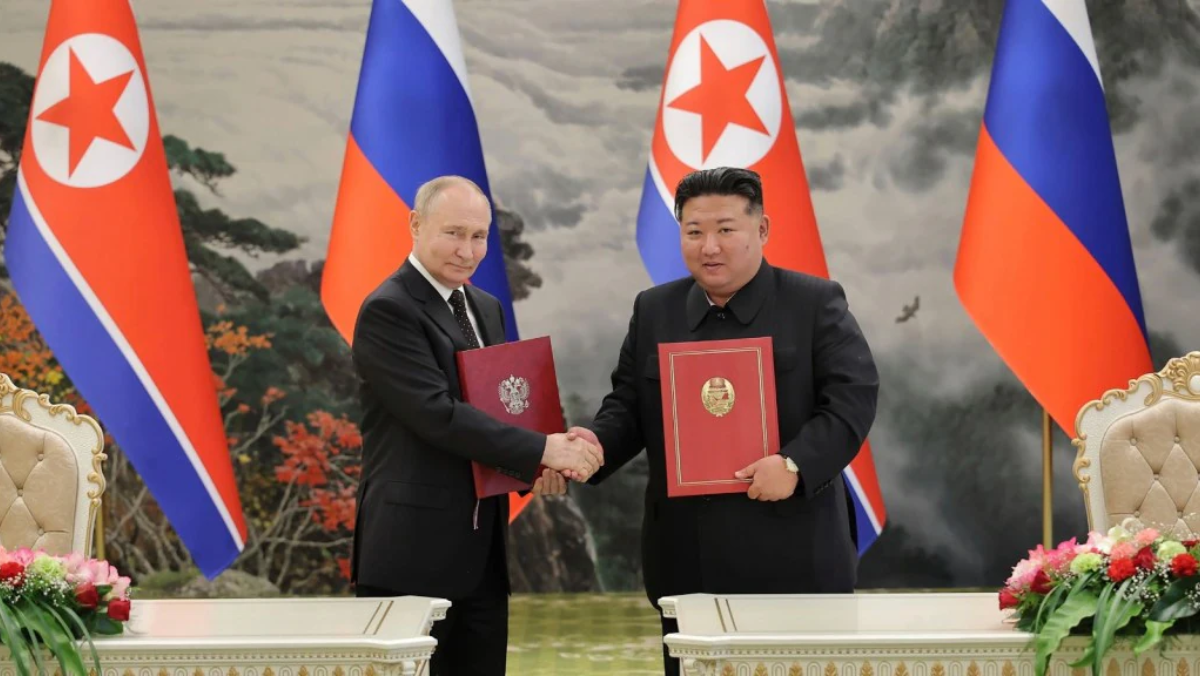The ongoing conflict in Ukraine has seen an intensification of hostilities, with Russia continually bolstering its military presence and support for separatist movements in the region. This conflict, rooted in Russia’s annexation of Crimea in 2014 and the subsequent unrest in eastern Ukraine, has strained relations between Russia and Western nations. The West, led by the United States and European Union, has imposed a series of economic sanctions on Russia, aiming to curtail its aggressive actions. However, Russia’s recent diplomatic moves suggest a broadening of its alliances, notably with North Korea, signaling a new phase in this geopolitical struggle.
A New Alliance: Russia and North Korea
In a surprising turn, Russia has entered into a new pact with North Korea, a country often isolated on the global stage due to its nuclear ambitions and human rights record. This alliance marks a significant shift in the geopolitical landscape, with both nations seeking to leverage each other’s strengths. For North Korea, this pact provides an opportunity to break its international isolation and gain access to new resources and technologies. For Russia, the alliance offers a strategic partner in East Asia, potentially counterbalancing the influence of the United States and its allies in the region.
Implications for the West
The new pact between Russia and North Korea raises several concerns for Western nations. Firstly, it complicates the already volatile situation in Ukraine. With Russia potentially receiving support from North Korea, whether through military supplies or diplomatic backing, the balance of power in the region could shift further in Russia’s favor. This development also poses a challenge to the sanctions regime imposed by the West. If North Korea can provide Russia with economic or technological support, it could undermine the effectiveness of these sanctions.
Additionally, this alliance could embolden other nations under Western sanctions, such as Iran and Syria, to seek similar partnerships. The potential for a network of nations united by their opposition to Western policies could lead to increased instability and conflict in various parts of the world. For the West, this means reassessing its strategies and potentially increasing diplomatic and economic pressures to counteract this new axis of influence.
Strategic Calculations & Motivations Behind the Pact
The motivations behind the Russia-North Korea pact are multifaceted. For Russia, the alliance serves as a countermeasure against the increasing military and economic pressure from the West. By aligning with North Korea, Russia can create a strategic buffer in East Asia, diverting some of the Western focus away from Europe. This move also sends a clear message to Western nations about Russia’s willingness to forge new alliances and escalate its geopolitical maneuvers in response to sanctions and military aid to Ukraine.
For North Korea, the benefits are equally significant. The alliance provides an opportunity to access new markets for its goods, receive military technology, and gain a powerful ally in the United Nations. This could enhance North Korea’s bargaining power in future negotiations over its nuclear program and sanctions relief. Moreover, the alliance allows North Korea to play a more prominent role in global affairs, challenging the narrative of its isolation and weakness.
Navigating a Complex Geopolitical Landscape
The alliance between Russia and North Korea adds a new layer of complexity to the global geopolitical landscape. For Western nations, navigating this new reality will require a combination of strategic patience, diplomatic agility, and military preparedness. Strengthening alliances with other East Asian nations, such as Japan and South Korea, will be crucial in countering the influence of the Russia-North Korea pact.
Moreover, the West will need to continue supporting Ukraine both militarily and economically to ensure it can withstand the increased pressure from Russia. Diplomatic efforts to resolve the conflict through negotiations and peace talks must be intensified, recognizing that the involvement of new actors like North Korea could either complicate or potentially aid in finding a resolution.
A Shifting Global Order
The Russia-North Korea alliance is emblematic of a broader shift in the global order, where traditional alliances and power structures are being challenged. As nations seek new partnerships to advance their strategic interests, the global landscape becomes increasingly multipolar and unpredictable. For policymakers and analysts, understanding the motivations and implications of these new alliances will be key to navigating the challenges and opportunities of this evolving geopolitical era.
